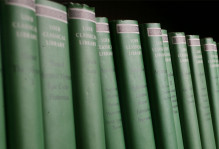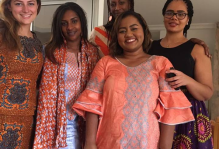What I did during my summer vacation…
The beach? “No.” Busch Gardens? “You’ve got to be kidding.” Three weeks by a lakeside cabin in Maine? Sounds good, but unfortunately “no” once again.
Instead, I spent the second week of August in Stillwater, Oklahoma, conducting archival research in the papers of former U.S. Senator Don Nickles. Senators Nickles was Assistant Republican Leader in the chamber from June 1996 to the end of 2002 and he graciously granted me access to the thousands of boxes of records relating to his congressional service. As best as I can tell, no other researcher has examined these materials. The Nickles papers are stored in the special collections department of the library at Oklahoma State University. These records are physically located in a renovated grocery store about a mile from the main OSU campus. Senator Nickles was an undergraduate at OSU and when he retired from the Senate he deeded his papers to his alma mater.
Basically, I spent the week pulling boxes and looking for letters and documents related to Senator Nickles’s work as assistant GOP leader, especially records of “whip counts” – private party polls of evolving member positions on major roll call votes. I won’t bore you here with the details about how I am using these kinds of materials in my research at William and Mary, but I’ve gathered information about almost a thousand whip counts conducted by House party leaders, 1955 to the current decade, using them as data to address a bunch of questions about the role and impact of parties in Congress. The project has received a lot of attention from congressional scholars and was even discussed in a New York Times political blog. Access to the Nickles papers will enable me to extend all of this analysis to the Senate. Indeed, his records include the results of over 100 whip counts conducted by the Senate majority leadership of the day, touching on issues like the Clinton impeachment, “No Child Left Behind,” and Medicare reform.
I know that many people would view a week of parsing old documents in a windowless archival warehouse in western Oklahoma as beyond tedious, but I seriously enjoyed the experience a great deal. It was exciting, for example, to read through dozens of folders about how Republican leaders like Nickles and Trent Lott set the agenda for the Clinton impeachment trial in 1999. More generally, the degree to which individual Senators, especially ideological moderates, changed positions in the days leading up to major policy decisions on the Senate floor actually surprised me a great deal. Assertions that Senators lock in their viewpoints prior to the onset of floor debate in the chamber are simply untrue.
During my first day in the OSU library, as I began to reproduce key documents to bring back to Williamsburg, the ancient photocopy machine in the special collections workroom completely died on me. There were no other working copy machines in the office that I could use. So I drove over to a local office supply store, plopped down a few hundred dollars for a portable Cannon copy machine, and hauled the thing back to the special collections room. Over the next few days, I used it to copy a couple of thousand pages of leadership records that hopefully will teach me, my students, and eventually the people who might read my books and articles on the topic something new about the role of leaders and parties in the Senate.
Stillwater, Oklahoma isn’t Nags Head or Ocean City, but I was able to gather some fascinating evidence that may surprise a lot of scholars — and I emerged from the experience without a sunburn and a bunch of stupid tshirts. And, the Mexican food in Stillwater is amazing.




No comments.
Comments are currently closed. Comments are closed on all posts older than one year, and for those in our archive.